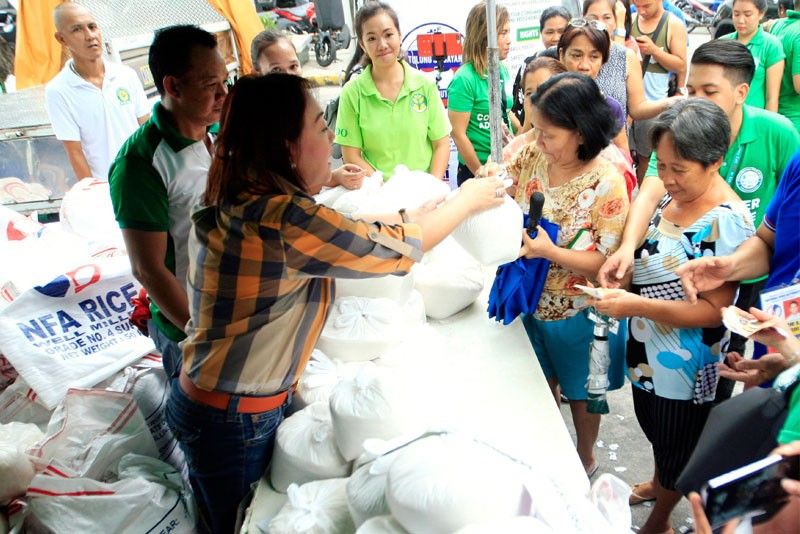NFA sees lower rice prices in two weeks

MANILA, Philippines — Rice prices are expected to decline in two to four weeks as the National Food Authority (NFA) floods the market with more supply.
“We’re just waiting for another importation of 250,000 metric tons (MT) plus our inventory. Maybe by that time, prices will go down. That’s what we are expecting two weeks to one month from now… that our prices would soften,” NFA spokesman Rex Estoperez told reporters after a meeting of the National Price Coordination Council (NPCC) on Wednesday.
He said the price of ordinary commercial rice could go down to as low as P37 to P39 per kilo from its current rate of P40 to P42 per kilo.
The NFA has increased its participation in the market to 20 percent from its previous 13 percent. This means releasing a supply of 128,000 bags per day from the previous 76,000 bags per day. NFA participates in the market by making available low-priced rice at P27 and P32 per kilo.
To further help stabilize prices and supply, the Philippines is set to import 750,000 MT of rice this year.
Trade Undersecretary Ruth Castelo said there is enough rice supply in the market as discussed during the NPCC meeting.
The Office of the President, through Memorandum Order 28 signed on Sept. 21 by Executive Secretary Salvador Medialdea, has also ordered the NFA to immediately release to the market approximately 230,000 MT of rice currently available in its warehouses.
While there is enough supply, Castelo said the Department of Trade and Industry (DTI) has asked NFA to consider relaxing requirements for members of the Philippine Amalgamated Supermarkets Association Inc. (PAG-ASA) to allow them to sell NFA rice.
Only one member of PAG-ASA has so far been able to make the affordable rice available to the public after the memorandum of agreement (MOA) signed by the group with the DTI and NFA to allow participating supermarkets to sell the staple at the mandated consumer price.
The MOA entered into by the DTI, NFA and PAG-ASA was intended to help increase availability of rice in the market.
Steven Cua, PAG-ASA president, said it has been difficult for them to help out as NFA has made it a requirement for firms with a P10-million paid up capital to pay P115,000 to secure a license to sell the staple.
“It is way too much for us,” he said, stressing members have no use for the NFA license after the rice supply issue is addressed.
He added that PAG-ASA members would want to be exempted from getting the NFA license in order to make affordable rice available in supermarkets immediately.
“Temporary is fine because we just want to add distribution outlets during this time (while there is a) perceived shortage,” Cua also said.
Another way to do it, he suggested, is for the NFA to select some supermarkets and allow these to sell rice at an affordable price.
“We will push NFA to relax requirements. What is important is to have visible, accessible and readily available NFA rice in the market,” Castelo said.
In Pangasinan province, a rice shortage is no longer experienced as the western and eastern NFA branches continue to distribute supply to its accredited retailers.
Chona Maramba, NFA Western Pangasinan assistant manager, said during a Kapisanan ng mga Brodkaster ng Pilipinas-Pangasinan forum that, as of Sept. 27, at least 19,699 bags of rice have been distributed.
NFA Western Pangasinan has 306 accredited retailers and each is given 30 bags per day while 10 other outlets that are outside the markets receive an allocation of 10 bags, she added.
Erlinda Cardenas, NFA-Eastern Pangasinan provincial economist, also told the provincial board on Sept. 24 that they have 21,243 bags of rice in their stock inventory and that this would be augmented with an additional 100,000 bags this October.
She said NFA-Pangasinan can still address the demand of rice in the province.
“Our accredited retailers are allowed to withdraw 480 bags weekly from our designated warehouses and as of this time we are giving 35 bags per outlet which is totaling to 67,200 bags monthly,” Cardenas said.
Meanwhile, President Duterte still managed to crack a joke during a speech in Malacañang by attributing the insufficiency in rice supply to the increase in the number of rehabilitated drug addicts in the country.
“Now that many are rehabilitated, we face a rice crisis. They (drug abusers) are now eating rice,” he said in jest after career executive service officers (CESOs) took their oaths at Malacañang’s Rizal Hall.
He added that to prevent another shortage in the future, authorities should give shabu to the drug addicts instead of the staple.
“Drug addicts are so hooked that they no longer eat properly, making them thin and fragile-looking. They eat shabu… You know why they are thin? Because they no longer eat food. And they keep on grinding their teeth…. If your child acts like that, it’s a red flag,” Duterte said. – With Eva Visperas, Christina Mendez
- Latest
- Trending
































